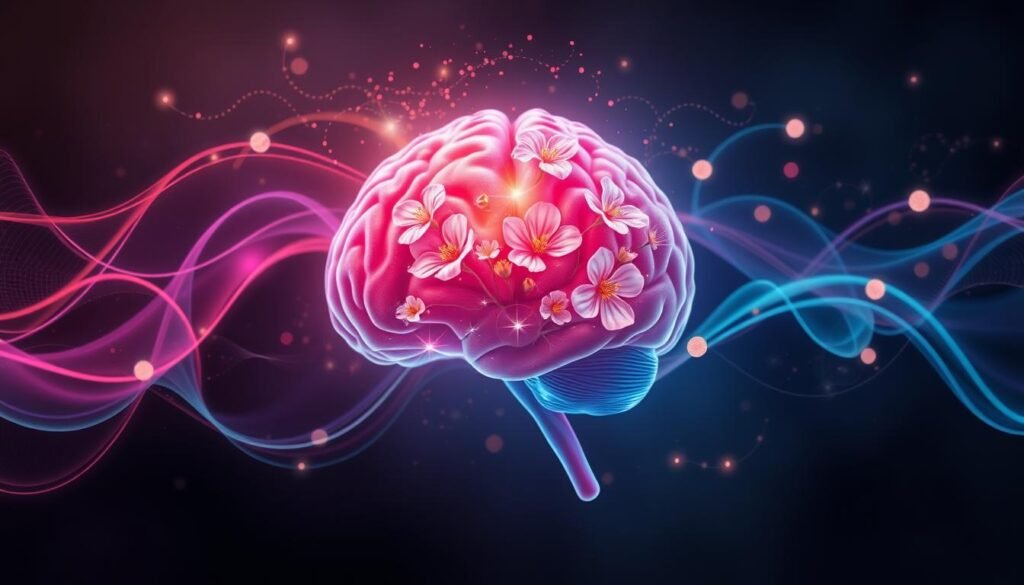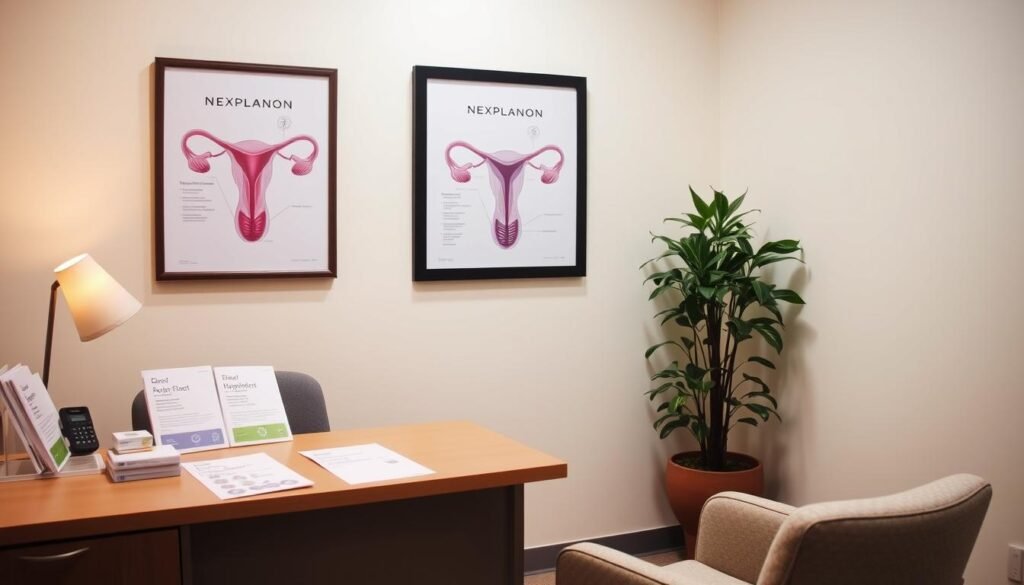Did you know that less than 1 in 100 women on Nexplanon get pregnant in a year? Its effectiveness is a big plus. However, its effects on mental health are often overlooked. Nexplanon, a widely-used hormonal birth control, can have side effects, including depression. It’s important to know how these contraceptives might affect a woman’s mental health. This piece explores if Nexplanon can cause depression and the science behind its effects on mood. It offers key insights for anyone using or thinking about using this method.
Key Takeaways
- Nexplanon is an effective birth control method, but it may come with emotional side effects.
- The implant releases etonogestrel, which can influence hormonal balance and mood.
- Depression is one of the reported side effects linked to hormonal birth control.
- Consultation with healthcare providers is crucial for managing potential mental health impacts.
- Awareness of mood changes is essential for users of Nexplanon.
- Understanding the side effects of hormonal contraception helps women make informed choices.
What is Nexplanon?
Nexplanon is a contraceptive implant known for its effectiveness. It stops pregnancy for up to three years. The FDA gave it the green light in 2001. It uses etonogestrel, a kind of progestin-only contraceptive.
A professional places it under the skin in the upper arm. Nexplanon stands out because it’s not like other birth control options. It’s only found under its brand name.
This implant works around the clock to block ovulation and stop fertilization. It’s a solid option for women who want dependable birth control. Some might experience side effects like changes in menstrual cycles, gaining weight, and acne. Luckily, these issues usually go away after the implant has been in place for a little while.
Even though Nexplanon is quite effective, some users face issues like irregular bleeding. This problem leads some to stop using it. It’s important to know how Nexplanon affects your health. This is true since studies have shown that birth control like this can play a role in mental health.
Research suggests that changes in hormones can alter mood and emotional state. This is something to think about if you’re considering a progestin-only contraceptive.
If you want to learn more about how hormones can impact mental health and the link between mood disorders and hormonal birth control, check out this informative article.
How Does Nexplanon Work?
Nexplanon is a top choice for birth control because it releases a hormone called etonogestrel. This hormone prevents eggs from being released by the ovaries. Also, it thickens the mucus around the cervix. This makes it hard for sperm to reach any eggs that might be there.
Additionally, Nexplanon changes the lining inside the womb. This might stop any fertilized eggs from attaching. Thanks to these actions, it’s more than 99% effective in preventing pregnancy when put in properly.
But Nexplanon can also change a woman’s menstrual cycle. At first, some might notice bleeding that’s not on a schedule. While some don’t get their period at all, others might bleed more often or for longer. These differences show how Nexplanon affects the body through hormones.
Nexplanon Side Effects
Those thinking about Nexplanon for birth control should know its possible side effects. They can be mild or serious. Commonly, people report irregular bleeding, weight gain, acne, and headaches. Some quit using it because of these issues, especially changes in their periods.
Serious side effects need quick attention. These include a higher chance of ectopic pregnancy and serious blood clots. This risk is higher for those who smoke. Ovarian cysts might also occur, creating more health problems. On average, users gain 2.8 pounds in the first year. After two years, this goes up slightly to 3.7 pounds. Mood swings and depression are also linked to Nexplanon due to hormone changes.
Other side effects include:
- Nervousness
- Back pain
- Nausea
- Dizziness
- Itching at the site of insertion
- Possible allergic reactions
While rare, some have bruised during the procedure. Even more serious, cases of liver disease have been noted. It’s crucial to understand all risks when considering this birth control method.
| Common Side Effects | Serious Side Effects |
|---|---|
| Irregular bleeding patterns | Risk of blood clots |
| Weight gain | Ectopic pregnancy |
| Acne | Liver disease |
| Headaches | Serious depression |
| Nausea | Cysts on ovaries |
This information is key for making a wise choice about birth control. It helps to consider possible hormonal effects too.
Understanding Hormonal Birth Control
Hormonal birth control, like Nexplanon, uses man-made hormones to manage reproductive cycles. These include progestin-only methods and those with both estrogen and progestin. These contraceptives can greatly affect your health, both physically and emotionally.
While many find them beneficial, some have noticed mood changes. Studies show a risk, especially in teens or those with mental health history. In Denmark, a 2016 study found more depression diagnoses in hormonal birth control users. This hints at a tricky link between birth control and mood.
However, not all research points to negative mood effects. Studies in the USA and Finland found users had less anxiety and depression than those not using these methods. Yet, progestin-only options might have worse effects on mood than combined methods.
The link between hormones and mood is complex. There’s a push for personalized choices in birth control. Concerns over mood effects can lead to choosing lower androgenic options or non-hormonal ones. Knowing how you react to these contraceptives helps with better choices.
| Method | Mood Impact |
|---|---|
| Combined Hormonal Birth Control | May reduce depressive symptoms in some studies |
| Progestin-Only Methods | Potentially linked to negative mood changes |
| Hormonal IUDs | Mixed results; some users report depression |
| Contraceptive Pill | Some evidence suggests improvement in mood |
| Copper IUD | No hormonal influence; neutral mood effects |
Can Nexplanon Cause Depression?
The link between hormonal birth control and mental health is still being studied. Studies show that mood changes can happen with Nexplanon use. It’s important for users to know about these potential mood changes.
Overview of Mood Changes Related to Hormonal Contraceptives
Women on hormonal contraceptives often report mood swings. They can feel anxiety, irritability, and depression. Each person’s experience is different. Some women have mood swings so severe they rethink their contraceptive choice. Interestingly, 1 out of 10 women quit Nexplanon because of changes in their bleeding, which might relate to their mood.
Reports and Studies Linking Nexplanon to Mental Health Issues
Studies have noted a link between Nexplanon and mental health issues. They found more depressive symptoms in users. Users also reported panic disorders. Some saw their mood improve after removing Nexplanon. This is because Nexplanon’s progestogen may impact mood-related brain pathways.
When thinking about Nexplanon, keep an eye on your mental health. Talk with doctors about your health history before choosing a contraceptive. For more details on side effects and what to watch for, visit this resource.
Mental Health Impacts of Hormonal Imbalance
Hormonal imbalances can really affect your mental health, especially with Nexplanon. Mood swings might happen as hormones go up and down. These changes mess with the brain chemicals that help us stay happy. Birth control can change estrogen and progesterone levels, which are key to feeling emotionally stable. If these get out of whack, you might feel anxious or sad.
The link between hormones and mental health is clear, especially with birth control side effects. It’s not just the hormones causing mood changes. Stress from dealing with birth control can make it worse. Knowing the signs, like mood swings, helps understand your mental health better.
- About 10-15% of women might feel depressed from hormonal changes.
- During hormone shifts, women of childbearing age can feel more anxious.
- It’s important to watch for changes in emotional health and specific moods with birth control.
Understanding the mental health effects of hormonal imbalance is key for women using Nexplanon. Managing both physical and mental health on birth control can create a better experience.

Symptoms of Depression to Watch For
It’s crucial to know the signs of depression if you’re using Nexplanon. Hormonal changes may impact your mood and mental health. Pay close attention to how you’re feeling emotionally. Since everyone experiences mood changes differently, spotting the common signs of depression early can help. This can lead to getting help sooner and better managing your mental health.
Common Signs of Depression
Keep an eye out for several common signs of depression, especially after starting Nexplanon:
- Persistent feelings of sadness or emptiness
- Loss of interest in activities once enjoyed
- Increased anxiety or irritability
- Changes in sleep patterns, such as insomnia or oversleeping
- Difficulty concentrating or making decisions
- Appetite changes, which may lead to weight gain or loss
- Fatigue or lack of energy
Knowing these symptoms of depression is key for anyone on hormonal contraceptives like Nexplanon. If you see any of these signs, it’s important to talk to a healthcare provider quickly. This can help you discuss your symptoms and possibly find ways to manage them better.
| Symptoms | Description |
|---|---|
| Persistent Sadness | Feeling low most of the day, nearly every day. |
| Anxiety | Increased feelings of worry or fear that may disrupt daily life. |
| Loss of Interest | Disinterest in activities or hobbies that were previously enjoyable. |
| Sleeping Changes | Sleep disturbances, including insomnia or oversleeping. |
| Fatigue | Chronic tiredness that does not improve with rest. |
Nexplanon Removal: What to Expect
Thinking about nexplanon removal is a big decision for those who want to stop using hormonal birth control. The removal process is simple and done in a doctor’s office. First, the area is numbed with a local anesthetic. Then, the implant is carefully removed from under the skin.
After it’s taken out, watching how your body reacts is crucial. You might experience mood swings, headaches, or menstrual cycle changes. These side effects are common and similar to those while on the implant. For more information, you can check out resources like what to expect when coming off hormonal contraceptives.

Many find that their fertility returns quickly after nexplanon removal. Research shows that chances of getting pregnant within the first year post-removal are low. This is good news for those wanting to conceive. However, there’s a risk of ectopic pregnancy, which requires attention if pregnancy occurs post-removal.
It’s important to keep talking to your healthcare provider after the implant is removed. Contact them if you notice any unusual or severe side effects. Knowing what to expect can make navigating the emotional and physical changes easier. It helps in transitioning back to your body’s natural cycle smoothly.
Managing Mood Changes While Using Nexplanon
When using Nexplanon, it’s important to watch for mood changes. These changes are due to the birth control’s hormones. They can make you have mood swings or feel anxious or depressed. It’s key to notice these changes early and know how to deal with them.
Tips for Coping with Side Effects
There are ways to handle Nexplanon’s side effects by changing your lifestyle. Here are some helpful tips:
- Stay Active: Working out can lessen anxiety and depression, making you feel better.
- Maintain a Balanced Diet: Eating right supports your mental health. Try to eat lots of fruits, veggies, whole grains, and proteins.
- Be Mindful of Caffeine and Sugar: Cutting back on caffeine and sweets helps manage mood swings, since they can make anxiety worse.
- Practice Stress-Reduction Techniques: Doing things like deep breathing, meditation, or yoga can help keep your emotions in check.
- Communicate Concerns: Talking to friends, family, and doctors can give you support and advice.
If mood changes get serious, seeing a doctor is vital. Telling your doctor about any strong symptoms helps them adjust your treatment. If mood swings or other effects are too much, you might need a different birth control method. To learn more about side effects, go here.
Consulting Your Healthcare Provider
Regular visits to a healthcare pro are key for Nexplanon users. It helps to have a space where you can freely discuss Nexplanon side effects. This includes effects on mental health. Talking openly can help manage any issues that come up.
About 12% of women might face major depression at some point. Each year, 8.4% might have a depressive disorder. It’s vital to ask for help if you notice mood changes. Getting advice from healthcare providers helps. They make sure you know how to handle mental health on Nexplanon.
Medical experts can calm worries about the birth control’s impact on mood. Patients can discuss potential mood swings. This leads to advice and treatment plans that fit. A survey found under half of U.S. women with major depression get the care they need. This shows we must reach out more.
It’s important to watch for signs of anxiety or depression. Healthcare providers should link mental health and birth control choices. Women with mental health issues might feel side effects more. Using professional advice can make this clearer.

Building a trust with your healthcare provider is crucial. It raises awareness and helps make smart choices about birth control. For more info, visit this link.
Conclusion
The link between Nexplanon and depression is a hot topic. Studies show mixed results about how hormonal birth control affects mood. Especially, it seems to affect women with a history of depression.
Knowing the effects on mood is key for Nexplanon users. Watching for any mood changes is important. It helps women choose the best birth control for them. Talking with doctors is also crucial to manage any negative effects.
Learning about Nexplanon’s impact on depression is vital. It helps people make informed choices. This ensures they pick a method that’s good for both mental and reproductive health.